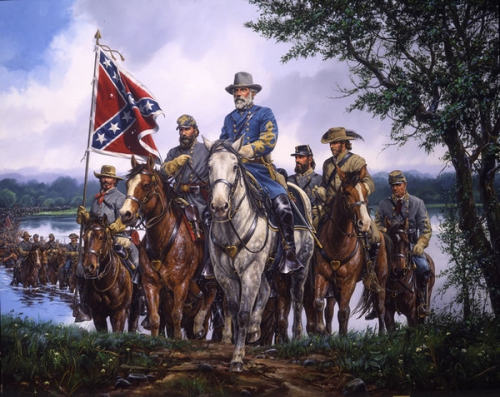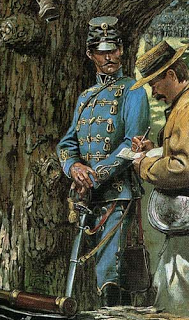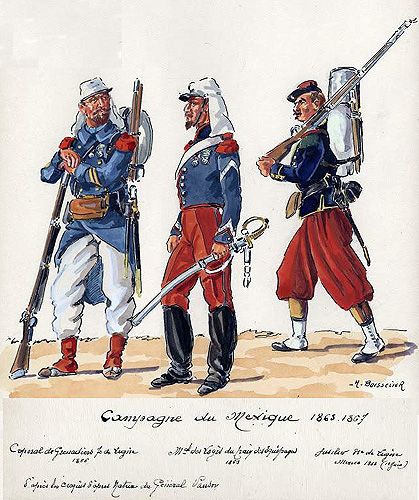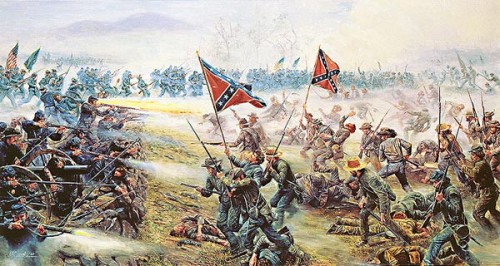samedi, 19 août 2017
The Austrian Empire and the Confederacy

The Austrian Empire and the Confederacy
The northern states were also home to large numbers of European immigrants who had fled their countries after failed revolutionary movements, so there were many Irish republicans in the north who detested the British Empire and many liberal Germans who had fled in the aftermath of the Revolutions of 1848. The only ‘Great Power’ to be seen at least as supportive of the U.S. government was the Russian Empire and this was mostly due to the fact that Britain and France were seen as friendlier to the Confederacy and the Russians hoped to counter this such as when Russia sold Alaska to the United States in order to prevent it being added to Canada by the British in a potential future conflict. The Austrian Empire was not extremely concerned about events in America, having many pressing problems of their own to deal with at the time, but that is not to say that they were not interested at all. Although the Emperor of Austria, Francis Joseph, had opposed the whole adventure, his younger brother was Emperor of Mexico and thus his fate, and that of the Austrian volunteer corps sent to aid him in Mexico, also depended almost entirely on the Confederates winning their independence.

As also pointed out previously, the Confederacy was also greatly influenced by the style of the Austrian Empire. The uniforms of the Confederate army were inspired by those of the Austrian light infantry and the first Confederate national flag was inspired by the ensign of the Austrian Empire, both being designed by the Prussian artist Nicola Marschall. The Emperor of Austria also had his own “eyes on the ground” so to speak, in the person of Captain FitzGerald Ross, a British-born officer of the Sixth Austrian Hussar Regiment. He made quite a stir in the southern states with his waxed moustache and braided Hussar uniform, in fact he was almost mobbed by admirers after being persuaded by some Confederate officers to wear his full dress uniform, fur busby, dolman and all, for a ride with them. He witness the Battle of Gettysburg, then went to Richmond, Charleston and then Chattanooga, Tennessee where he observed the fight from the lines of the Confederate General Braxton Bragg. He also visited the Gulf coast, Mobile, Alabama and so on. Like many, he was very impressed by the Confederate military and, like many more, was also impressed by the southern ladies. He became an ardent Confederate sympathizer, even to the point of picking up a rifle and taking part in a battle during his long stay in the south. When Ross finally returned to Europe, no matter what bad news reached him, he remained confident that the south would ultimately win.
Such a thing would have, inadvertently, greatly expanded Austrian influence in the New World given that the establishment of a Habsburg monarchy in Mexico (or rather the ‘reestablishment’) would have given Austria a sort of foothold in the region. Confederate President Jefferson Davis was certainly aware of this and tried to enlist the Prussian observer, Captain Justus Scheibert, as an envoy to Emperor Napoleon III of France. He proposed a sort of Franco-Confederate alliance, pointing out that in the Mexican War (of which Davis was a noted veteran) the U.S. had defeated Mexico with only 12,000 men and that if Napoleon would lift the Union blockade of the southern coast, which Davis believed could be done with ‘the stroke of a pen’ and would ensure a Confederate victory, he would supply 20,000 Confederate troops to aid the Emperor Maximilian of Mexico, explaining that southern troops were adjusted to the climate and familiar with the fighting style of the Mexicans.
However, this, as we know, did not come to pass. Although tempted, none of the European powers ultimately were bold enough to risk war with the United States by recognizing the Confederacy (though Pope Pius IX did address a letter to Jefferson Davis as President of the C.S.A.). When the Confederacy fell, the effort to spread monarchy in the Americas quickly fell apart. The U.S. government dispatched an army to the south Texas border and warned the French to withdraw or face war. Napoleon, not wishing to see the enterprise be for nothing, hoped that the Austrian Empire would take up the French cause of supporting the Mexican imperialists. A further 2,000 Austrian volunteers (roughly) were assembled at the port of Trieste, ready to embark for Mexico and fight for Emperor Maximilian. It was, though, at that point that the Union government stepped in by way of U.S. Minister to Vienna John Lothrop Motley who went to the Hofburg and informed the Austrian Emperor quite bluntly that the U.S. recognized only Benito Juarez as the leader of the legitimate Mexican government and that if the Austrian troops were allowed to leave, the U.S. would consider the Austrian Empire to be at war with the Mexican Republic and the U.S. Navy would take retaliatory action on behalf of Mexico.

The expedition was thus canceled, the Austrian soldiers disbanded and the Austrian Volunteer Corps already fighting in Mexico was promptly recalled. Many had already been slaughtered at the Battle of Santa Gertrudis where, seeing which way the winds were blowing, their comrades of the Mexican Imperial Army had deserted in the middle of the battle to join the republicans. The surrender of General Lee at Appomattox Court House in 1865 had set the dominos to falling, the Austrians pulled out and shortly thereafter the Habsburg Emperor of Mexico was captured and shot, the Austrian Emperor then even having a difficult time retrieving the body of his slain younger brother. The Imperial House of Habsburg had had a presence in the Americas ever since Philip the Handsome and Charles V had held their Spanish crowns until the succession was taken up by the Bourbons of France. In 1864, however, another Habsburg returned to, he hoped, usher in a new era of monarchy in the Americas but with the fall of the Confederacy, it was inevitable that the Habsburgs would once again lose their place in the New World.
01:35 Publié dans Histoire | Lien permanent | Commentaires (0) | Tags : histoire, sudistes, confédération, confédérés, états-unis, guerre civile américaine, guerre de sécession, mexique, empire austro-hongrois |  |
|  del.icio.us |
del.icio.us |  |
|  Digg |
Digg | ![]() Facebook
Facebook
jeudi, 22 octobre 2009
"Ballade au Pays de Scarlett": le nouveau livre de Jean-Claude Rolinat
 “ Ballade au pays de Scarlett ”,
“ Ballade au pays de Scarlett ”,
le nouveau livre de Jean-Caude Rolinat…
Cinq questions à Jean-Claude Rolinat :
Jean-Claude Rolinat vient de publier « Ballade au pays de Scarlett» aux Editions Fol’fer, dans lequel il évoque ce Deep South conservateur qui refusa la normalisation voulue par Washington et s’engagea dans une guerre dite de sécession. Conçu comme un abécédaire tout à la fois historique et touristique, le pays de Scarlett a trouvé en Rolinat un de ses meilleurs portraitistes. L’auteur n’a pas seulement saisi le cliché de ce Sud profond, il en a capté l’âme.
Catherine Robinson
Quelle est l’ambition de cette “ Ballade au pays de Scarlett ” ?
Au risque de paraître prétentieux, j’écris les livres que j’aurais aimé lire… D’autre part, s’agissant de celui-ci, j’ai dû aller onze ou douze fois aux Etats-Unis, plus particulièrement dans le Sud, et, à chaque voyage, je sentais monter en moi l’irrésistible envie de “ témoigner ”, d’inciter les gens à venir admirer des paysages autres que les merveilleux mais classiques décors de l’Ouest, sentir la geste, l’épopée d’un peuple qui résista de 1861à 1865 à l’énorme machine de guerre nordiste… De plus, dans nos milieux, il est de bon ton de confondre l’Amérique avec son gouvernement, de faire de sa pseudo intelligentsia le reflet frelaté du pays réel. Si le monde devait juger la France à travers les chansonnettes de Carla Bruni… au secours ! Il ne faut donc pas confondre le gouvernement fédéral de cette puissante thalassocratie forcément impérialiste qui, au passage, ne se nourrit que de nos faiblesses, avec le peuple de l’Amérique profonde, rurale, conservatrice, où les gens sont attachés, tout comme nous, aux simples valeurs traditionnelles. Et puis, “ les forts en gueule ” de l’anti-américanisme primaire, sans discernement, sont souvent les mêmes qui, jadis, étaient pétrifiés de trouille face aux chars soviétiques, bien contents alors d’avoir les GI’s de l’Oncle Sam présents en Europe. Cela étant dit, les temps ont changé, j’en suis bien conscient.
J’espère que l’achat de ce livre poussera plus d’un lecteur à boucler sa valise et à atterrir à Atlanta, à la Nouvelle Orléans, à Memphis ou à Nashville car, tout en étant un petit ouvrage historico-politique, c’est aussi surtout, et avant tout, un guide touristique.
L’Amérique telle que vous nous la décrivez est loin de ressembler aux modèles des séries télé américaines et encore plus loin de ce prétendu vide culturel comme d’un certain mode de vie envahissant (Pop Art, fast food…). Qu’en est-il réellement ?
L’Amérique est à elle seule un condensé du monde entier : toutes les ethnies de la terre s’y côtoient. Toutefois, les Etats du Sud font entendre leur petite musique particulière. Sans doute parce que c’est là que la vieille Europe et sa civilisation survécurent le plus longtemps. Et puis la nature, je ne vous dis que ça ! Des chênes d’où pend comme des guirlandes de Noël la mousse espagnole, la vigne vierge qui part à l’assaut des fils électriques, des torrents bondissants et des chutes d’eau spectaculaires (c’est là qu’ont été tournés par exemple des films tels que Le Dernier des Mohicans ou Délivrance), des magnolias fleuris, des marais aux eaux noires comme la stout irlandaise où les alligators ne dorment que d’un œil… Les paysages et l’histoire, ainsi que les peuples qui les habitent et qui la font, sont étroitement imbriqués, indissociables, mêlant à chaque instant, à chaque coin de rue passé et présent. Malgré la malédiction de l’esclavage ou à cause de lui, Noirs et Blancs qui, comme l’huile et l’eau, ne se mélangent guère, sont toutefois parties prenantes de ces Etats américains à part entière et entièrement à part, inséparables, comme les bandes zébrées du célèbre mammifère africain. Quant au “ vide culturel ” que vous évoquez, il suffit de franchir les portes de n’importe quel musée des villes du Sud pour tordre le cou à cette rumeur…
Parmi les multiples sujets historiques, vous traitez de Napoléon III et des Sudistes. Pourriez-vous nous en dire quelques mots ?
L’empereur Napoléon III, qui vérifiait ce que Tocqueville avait pressenti une ou deux décennies avant lui, voulait contenir sinon contrecarrer cette puissance émergente. Ce qui explique qu’il souhaita jouer un rôle d’arbitre dans le conflit entre les Etats qui, quelque part, l’arrangeait bien dans sa tentative de mettre un prince européen sur le trône du Mexique. Il informa le représentant de la Confédération, Sidell, qu’il espérait obtenir une suspension des hostilités. Une façon pour lui d’afficher ses préférences sudistes. Mais l’Angleterre ne suivit pas la France, la Russie non plus. Alors, il abandonna. Le gouvernement de l’Union s’en souviendra, en soutenant ouvertement Juarez contre Maximilien que Napoléon III avait imposé comme Empereur aux Mexicains. On connaît la suite…
Question guide touristique, vous nous indiquez, parmi les perles du Sud, une petite ville du nom de Madison à voir impérativement. Quelle est sa particularité ?
À elle seule, la petite cité de Madison en Géorgie, située sur l’Interstate 20 à l’est d’Atlanta, même si elle n’a pas l’ampleur de la somptueuse Savannah ou de la nonchalante et élégante Charleston, est la quintessence des villes du Sud : maisons antebellum de style victorien, antiquaires et végétation rafraîchissante. Et puis, c’est une des rares agglomérations qui échappa à la fureur de ce pyromane de général Sherman dans sa marche vers la mer…
S’il n’y avait qu’un livre d’écrivain du Sud à citer – hormis Margaret Mitchell –, quel est celui que vous choisiriez ?
Disons deux ou trois… Puiser au hasard dans l’œuvre de Faulkner bien sûr, avec son récurrent et mythique comté de Yoknapatawpha qui pourrait bien être celui d’Oxford où il vivait dans le Mississippi, sans oublier non plus Vladimir Volkoff avec ses Nouvelles américaines ainsi que Dominique Venner avec Le Blanc Soleil des Vaincus car, après tout, the South gonna rise again !
Propos recueillis par Catherine Robinson
Publié dans le quotidien Présent
Jean-Claude Rolinat, Ballade au pays de Scarlett, Atelier Fol’Fer, BP 20047, 28260 Anet. Tél : 06 74 68 24 40. Fax : 09 58 28 28 66. Prix : 26 euros franco.
NDLR : Jean-Claude Rolinat participera à la 3ème journée nationale et identitaire organisée par Synthèse nationale, mercredi 11 novembre prochain au Forum de Grenelle (5, rue de la Croix Nivert 75015 Paris). Il dédicacera ses livres.
Source : Synthèse Nationale [1]
Article printed from :: Novopress Québec: http://qc.novopress.info
URL to article: http://qc.novopress.info/6688/%e2%80%9c-ballade-au-pays-de-scarlett-%e2%80%9d-le-nouveau-livre-de-jean-caude-rolinat/
URLs in this post:
[1] Synthèse Nationale: http://synthesenationale.hautetfort.com/archive/2009/10/15/ballade-au-pays-de-scarlett-le-nouveau-livre-de-jean-caude.html
00:18 Publié dans Histoire | Lien permanent | Commentaires (0) | Tags : livre, histoire, etats-unis, sudistes, confédération |  |
|  del.icio.us |
del.icio.us |  |
|  Digg |
Digg | ![]() Facebook
Facebook


